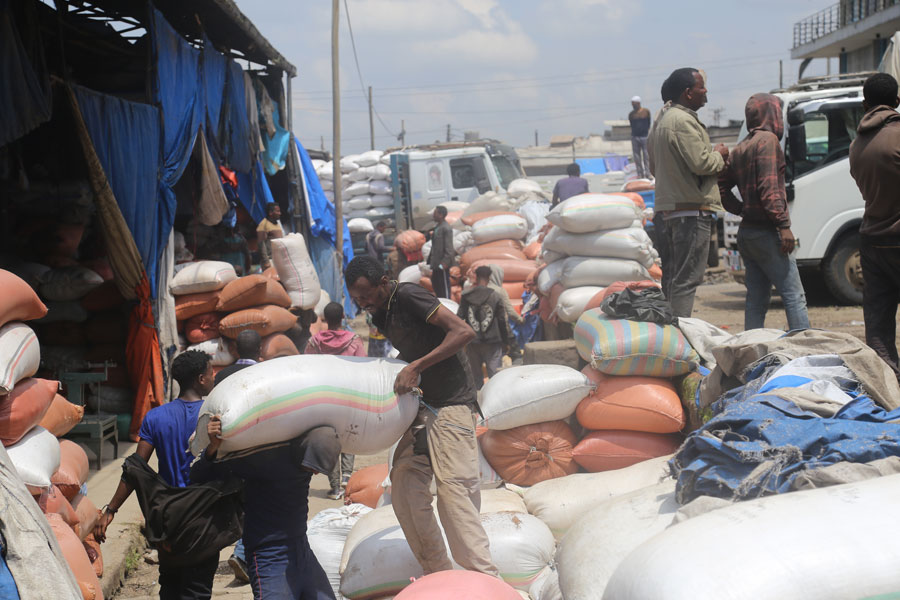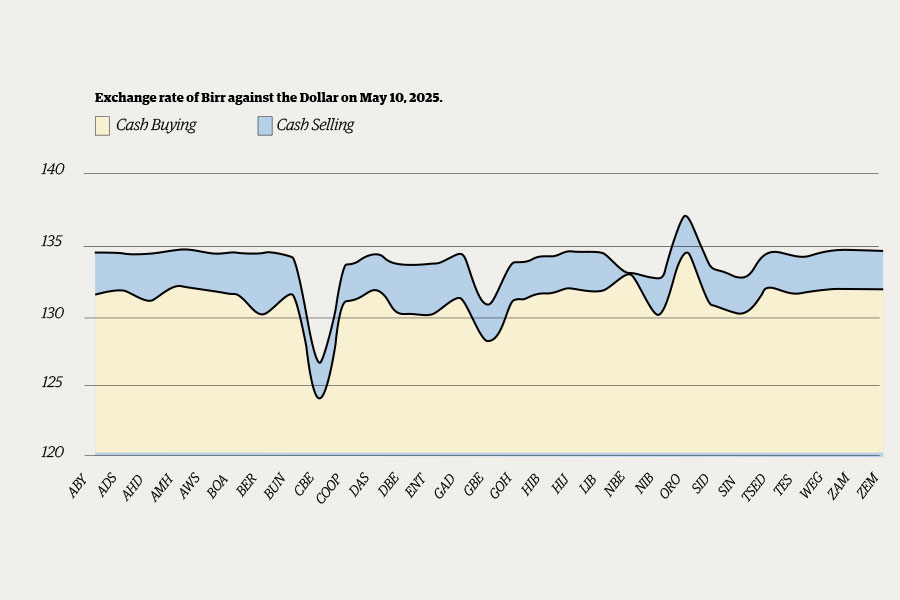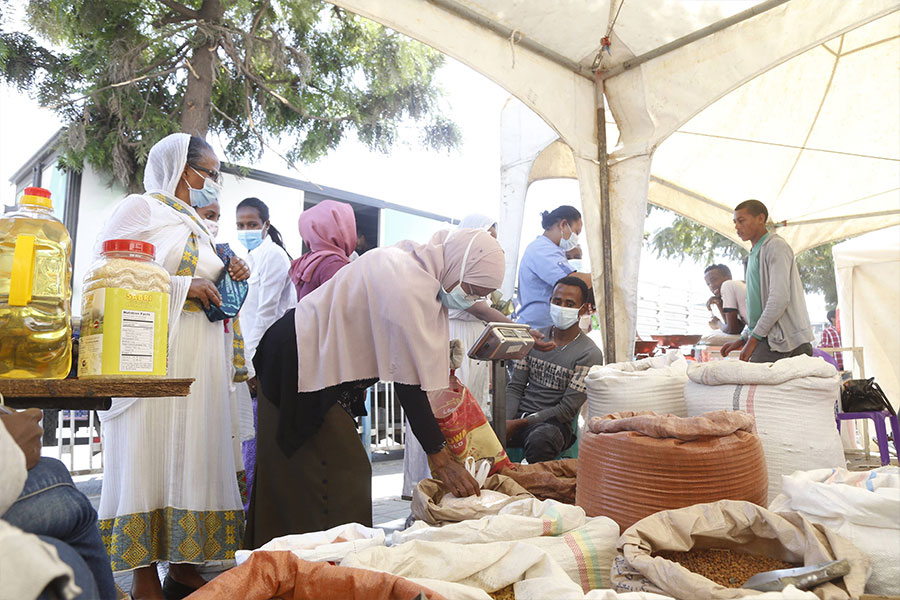
Nov 18 , 2023
By Selome Getachew
The coffee sector faces a critical juncture with stranded and unexported beans remaining large in volume. A drastic shift from the historical market performance, coffee exporters are confronted with a surplus of unexported coffee. Sky-high cherry prices have left the market in a lurch as new regulations and loan restrictions reshape the coffee landscape, writes Selome Getachew (sol_get@yahoo.com), a James Madison University certified manager and a founding managing director of Bridge Investment Consultancy.
Ethiopia holds a special place in the annals of global coffee production. Acclaimed as the birthplace of the cherished bean, it has built a reputation for producing some of the finest coffee in the world. Characterised by its rich traditions and historical significance in the coffee market, the country is the fifth-largest producer globally. Yet, as the current fiscal year unfolds, Ethiopia faces a daunting predicament that threatens to undermine the very foundation of its coffee industry.
The recent turmoil in the coffee market illuminates the delicate balance between domestic interests and international trade dynamics. This year, approximately 80,000tn of coffee remained unexported, an evident departure from the usual performance in the global market. The root cause of this disruption lies in the domestic market dynamics, particularly the inflated cherry prices that discouraged exporters. They had previously purchased red cherries at exorbitant rates, soaring between 80 Br to 90 Br a kilogram.
This strategy, however, backfired, leading to a glut in the market and subsequent losses for both the exporters and the national economy.
As the new crop year began, the scenario altered. Competition among exporters for cherry purchases was notably less fierce than the previous year. The change was partly due to many exporters still keeping unsold stocks from the prior year, coupled with diminished export opportunities. Compounding this situation was the introduction of new regulations by the National Bank of Ethiopia (NBE), which restricted access to loans, thus squeezing the liquidity available to companies.
The series of events led to a relative stabilisation in cherry prices at the onset of the year, with prices beginning at 25 Br for a kilo in some regions and 30 Br in the Oromia Regional State, a significant contributor to Ethiopia's coffee output.
However, a recent development has added a new twist to this unfolding drama. The issuance of a circular letter by the "Oromia Gebeya Limat" mandated farmers to sell their cherries within the price range of 45 Br 50 Br, markedly higher than the previous range of 30 Br to 35 Br for a kilo. This directive, along with the closure of certain stations under the pretext of providing farmers with an additional 10 to 20 Br, has raised concerns about a potential repeat of last year's pricing debacle.
The federal government faces a complex task in balancing the interests of farmers and the broader coffee production ecosystem. Ensuring that any measures to support farmers are well-considered and inclusive is crucial. As seen in other coffee-producing countries, misguided incentives or subsidies could disrupt the entire coffee transaction chain.
A case in point is Vietnam's coffee industry, which has witnessed phenomenal growth, defying the global price regimes that often dictate prices in other coffee-producing countries. According to FAOSTAT, Vietnam's coffee production soared from 92,000tn in 1990 to an impressive 1.6 million tonnes in 2019. This growth trajectory sharply contrasts with the decline observed in African coffee producers like Ethiopia and Kenya.
Vietnam's success can be attributed to its government's proactive role in the coffee sector. The World Bank acknowledged its sweeping involvement across the coffee value chain, from input and credit markets to policy and regulatory frameworks. This involvement included land allocation laws, price stabilisation measures, and incentives that boosted farmers' productivity. The latter contains preferential credit for growers and exporters, export bonuses, and government programs that facilitated land access and provided technology, extension services, and financial support.
Ethiopia can draw valuable lessons from Vietnam's approach to reviving its coffee sector. Forcing farmers to sell their products at inflated prices under unfavourable market conditions cannot be one of them. It could lead to an overstock crisis, mirroring last year's experience. Rather than resorting to reactive measures, policymakers need to focus on sustainable, long-term solutions that balance local needs with global market dynamics.
PUBLISHED ON
Nov 18,2023 [ VOL
24 , NO
1229]


Fortune News | Aug 19,2023

Radar | Apr 21,2024

Money Market Watch | May 24,2025

Radar | Aug 10,2019

Fortune News | Jul 17,2022

Radar | Sep 18,2023

Viewpoints | Feb 10,2024

Radar | May 23,2021

Commentaries | Apr 24,2021

Agenda |

My Opinion | 131674 Views | Aug 14,2021

My Opinion | 128040 Views | Aug 21,2021

My Opinion | 126002 Views | Sep 10,2021

My Opinion | 123625 Views | Aug 07,2021

Dec 22 , 2024 . By TIZITA SHEWAFERAW
Charged with transforming colossal state-owned enterprises into modern and competitiv...

Aug 18 , 2024 . By AKSAH ITALO
Although predictable Yonas Zerihun's job in the ride-hailing service is not immune to...

Jul 28 , 2024 . By TIZITA SHEWAFERAW
Unhabitual, perhaps too many, Samuel Gebreyohannes, 38, used to occasionally enjoy a couple of beers at breakfast. However, he recently swit...

Jul 13 , 2024 . By AKSAH ITALO
Investors who rely on tractors, trucks, and field vehicles for commuting, transporting commodities, and f...

Jun 28 , 2025
Meseret Damtie, the assertive auditor general, has never been shy about naming names...

Jun 21 , 2025
A well-worn adage says, “Budget is not destiny, but it is direction.” Examining t...

Jun 14 , 2025
Yet again, the Horn of Africa is bracing for trouble. A region already frayed by wars...

Jun 7 , 2025
Few promises shine brighter in Addis Abeba than the pledge of a roof for every family...

Jun 29 , 2025
Addis Abeba's first rains have coincided with a sweeping rise in private school tuition, prompting the city's education...

Jun 29 , 2025 . By BEZAWIT HULUAGER
Central Bank Governor Mamo Mihretu claimed a bold reconfiguration of monetary policy...

Jun 29 , 2025 . By BEZAWIT HULUAGER
The federal government is betting on a sweeping overhaul of the driver licensing regi...

Jun 29 , 2025 . By NAHOM AYELE
Gadaa Bank has listed 1.2 million shares on the Ethiopian Securities Exchange (ESX),...